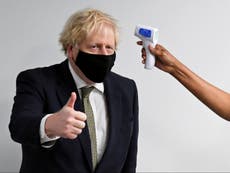UK Covid-19 alert level raised from 4 to 5
‘We are not confident that the NHS can handle a further sustained rise in cases,’ say government’s scientific advisers

Your support helps us to tell the story
From reproductive rights to climate change to Big Tech, The Independent is on the ground when the story is developing. Whether it's investigating the financials of Elon Musk's pro-Trump PAC or producing our latest documentary, 'The A Word', which shines a light on the American women fighting for reproductive rights, we know how important it is to parse out the facts from the messaging.
At such a critical moment in US history, we need reporters on the ground. Your donation allows us to keep sending journalists to speak to both sides of the story.
The Independent is trusted by Americans across the entire political spectrum. And unlike many other quality news outlets, we choose not to lock Americans out of our reporting and analysis with paywalls. We believe quality journalism should be available to everyone, paid for by those who can afford it.
Your support makes all the difference.The UK’s chief medical officers have called for the country to be moved into Covid-19 Alert Level 5 for the first time, which means the NHS is at “material risk” of being overwhelmed.'
In a joint statement alongside NHS England’s medical director, Stephen Powis, the government’s scientific advisers warned that the the NHS in all four nations is “already under immense pressure”.
The rapidly escalating spread of Covid-19 is being driven by the new variant of the virus, which is found to be more transmissible.
“We are not confident that the NHS can handle a further sustained rise in cases and without further action there is a material risk of the NHS in several areas being overwhelmed over the next 21 days,” said the statement.
The recommendation by Professor Chris Whitty, Dr Frank Atherton, Dr Gregor Smith, Dr Michael McBride and Mr Powis comes after advice from the Joint Biosecurity Centre and “in light of the most recent data”.
According to government figures, the UK reached another record daily high in new coronavirus cases with 58,784 new infections recorded on Monday - the highest figure since the start of the pandemic last year.
It marks the seventh consecutive day that there have been more than 50,000 new cases daily in a 24-hour period across Britain.
The most recent NHS England figures also show that hospital admissions of people with Covid-19 have reached a record high, with a total of 3,145 admissions in England reported for 2 January.
The previous peak was of 3,099 admissions, set on 1 April 2020. The figure comprises all patients admitted in the previous 24 hours who were known to have been infected by coronavirus, as well as any patients diagnosed in hospital with the virus in the previous 24 hours.
Chris Hopson, chief executive of NHS Providers, said the figures on hospital admissions showed the pandemic was at a “critical point” and urged the government to take “immediate and decisive action”.
He said: “Trust leaders are clear about the cost and impact of tighter restrictions. But they are also clear that if we are to prevent significant numbers of unnecessary deaths, reduce patient harm and give the NHS the best chance of treating all the patient who need care, the government must now immediately tighten the current tier system rules.”
Prime minister Boris Johnson is set to make a televised address to announce tighter coronavirus restrictions for England on Monday evening at 8pm. Scottish First Minister Nicola Sturgeon announced a lockdown for Scotland earlier in the day, with a legally enforceable order to stay at home, until February.
Mr Hopson added: “Hospitals are filling up with Covid patients at a deeply alarming rate. Today’s figures show that, in the 10 days since Christmas, we’ve seen nearly 9,000 more Covid patients in hospital beds.
“That’s equivalent to 18 hospitals full of new Covid patients in just 10 days. Any changes must therefore have a significant impact as quickly as possible. Half measures at this point would be very dangerous."
The UK’s chief medical officers sought to reassure the public to continue going to hospital if they require “emergency care”, adding that it was “absolutely critical”.
“Although the NHS is under immense pressure, significant changes have been made so people can still receive lifesaving treatment,” said the joint statement. “It is absolutely critical that people still come forward for emergency care. If you require non-urgent medical attention, please contact your GP or call NHS11.”





Join our commenting forum
Join thought-provoking conversations, follow other Independent readers and see their replies
Comments